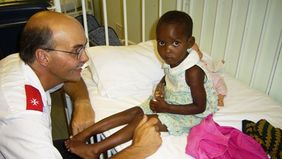Today my friends and I are going to collect our retirement pensions. We will all meet at the pension office. We have a lot to tell each other and then we will buy fruit and bread from the market women at the roadside outside the pension office. Today should be a joyful day with all the anticipation of Christmas. But there is no joy, no joyful anticipation. On the contrary, most of us are exhausted, not only because we have to walk long distances in the heat and blazing sun, but also because we have to look after our grown-up children who are suffering from AIDS and try to take care of all the grandchildren. Nokuthula, my 26-year-old daughter died in October from AIDS-related infections. She left me her three children and I have to take care of them. The youngest of them is called Mbali. Mbali is now four years old and now has the same signs of illness that her mother had. She is too weak to walk, so I have to carry her around on my back. Thokozani (7 years old) and Fikile (6 years old) are also too young to stay at home alone in an area where violence, rape and child abuse are part of everyday life. We must look pretty pathetic walking along the muddy paths together. Mbali and her mother were closely bonded, especially as she was breastfed for two and a half years. But it was this love that was to seal her fate, as she too now has terminal AIDS. Mbali's father died in 2002, and as I leave the pension office, carrying home my few oranges and the loaf of bread from the roadside market women for dinner, I think about what will happen to the children when I die. I am 82 now and not too strong. But I don't have much time to think, I have much more pressing problems. Mbali cries, she has diarrhoea, mouth rot, refuses any food and is only skin and bones. How am I supposed to cope with that? One of my friends tells me about Blessed Gérard's Hospice, where they had taken care of her daughter. She was so impressed that she suggested I go there with Mbali. I turn around and march the eight kilometres with Mbali on my back and Thokozani and Fikile behind me. Finally I reach Blessed Gérard's hospice. I am welcomed with human warmth and respect at the reception. It is pleasantly cool in here and we can finally sit down. Mbali is so weak that she is lying on the floor. A nurse comes and picks her up; we are taken to a common room where we are offered something cool to drink. The nurse takes Mbali to the examination room. There we decide together that she should be admitted to the hospice as an in-patient. I am very sad, but my heart is suddenly much lighter and I am so grateful. The people are so kind to me and to the children. Mbali is taken to a nice clean room where there are other children, but she is too weak to even notice. I leave here with elated steps, although it is a long way home, but I know Mbali is in good hands. The compassionate and attentive people at Blessed Gérard's Hospice have told me that when Mbali is a little stronger, they will take her upstairs to Blessed Gérard's Children's Home where she can play and learn and be cared for with much love. Thank you, the people who work at Blessed Gérard's Hospice and Blessed Gérard's Children's Home. You have helped me enormously. I know Mbali will get all the care she needs, so I can celebrate Christmas with her sister and brother in joy." Epilogue: Mbali really had a happy Christmas, but her condition deteriorated over the next few weeks and finally God called her to Himself at the end of February 2004.
In six days it will be Christmas ...

Back